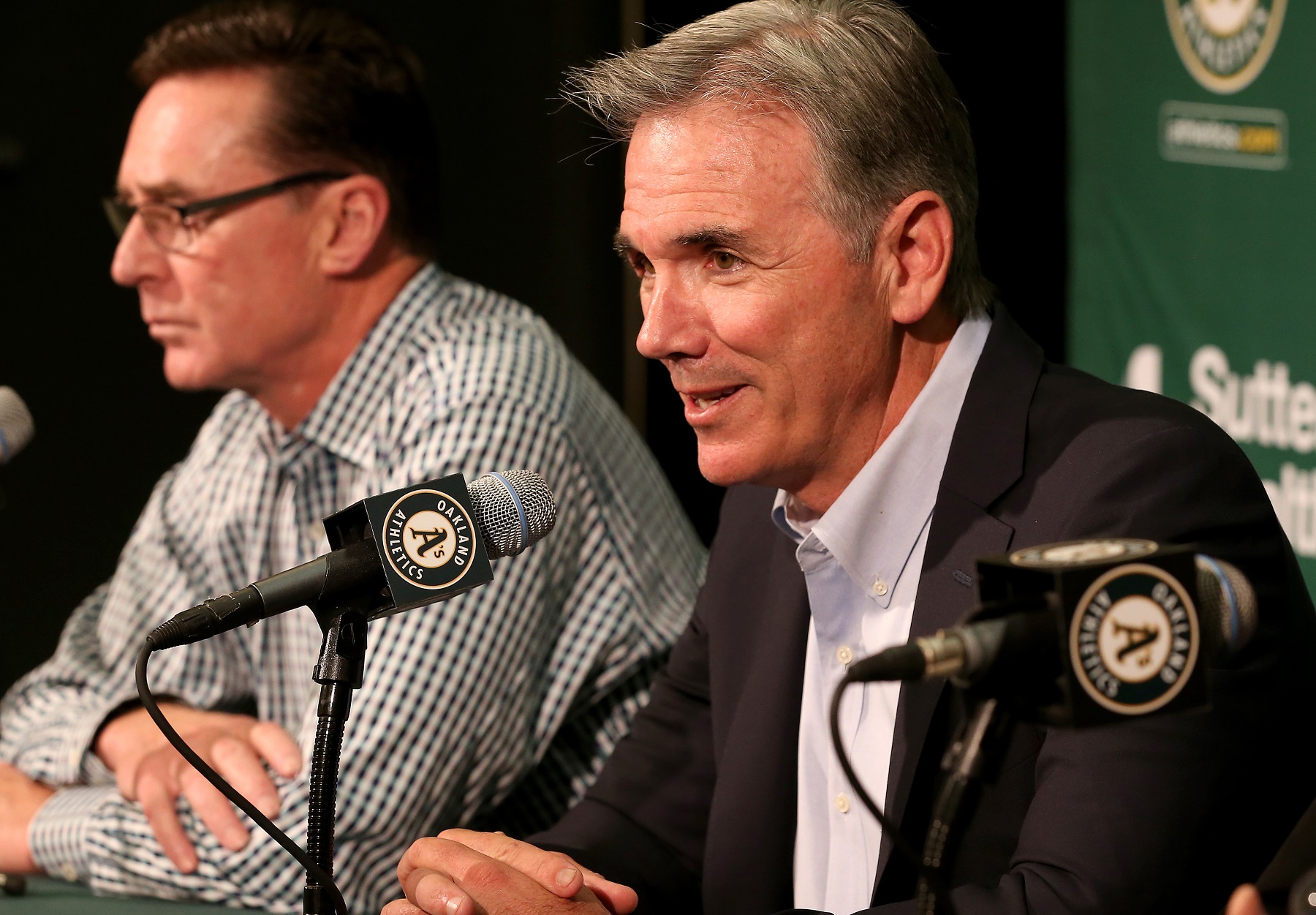Billy Beane's Moneyball Legacy: Stats & Success
Could a baseball team, operating on a shoestring budget, truly compete with the giants of the sport? Billy Beane proved, unequivocally, that it could be done, changing the very fabric of baseball in the process.
The story of Billy Beane, the former baseball player and current executive, is one of strategic brilliance, defying conventional wisdom, and ultimately, transforming the Oakland Athletics into a symbol of innovation in a sport steeped in tradition. His approach, born out of necessity and a keen understanding of data, reshaped how teams evaluated talent and built winning rosters. Beane, armed with a commitment to efficiency and a willingness to challenge the status quo, demonstrated that smart decisions, not just deep pockets, could pave the path to success. The A's, under his leadership, consistently found ways to contend, even when facing financial limitations that would cripple other franchises.
| Category | Details |
|---|---|
| Full Name | William Lamar Beane III |
| Born | March 29, 1962 |
| Birthplace | Orlando, Florida, USA |
| Current Residence | Danville, California |
| Education | Mt. Carmel High School (San Diego) |
| Current Position | Senior Advisor to the Owner & Minority Owner of the Oakland Athletics |
| Former Position | Executive Vice President of Baseball Operations (Oakland Athletics), General Manager (Oakland Athletics) |
| Playing Career | Outfielder (MLB - New York Mets, Detroit Tigers, Oakland Athletics) |
| Net Worth (Estimated) | $20 million (as of June 2022, estimated) |
| Annual Salary (Estimated) | $3 million (at Athletics, but has been reported to be over $8 million) |
| Key Accomplishment | Revolutionizing baseball player evaluation and team management through Sabermetrics, leading the Oakland Athletics to significant success despite a limited budget. |
| Book/Film Depiction | "Moneyball: The Art of Winning an Unfair Game" by Michael Lewis (Book) and "Moneyball" (2011 film starring Brad Pitt) |
| MLB Official Website |
Beane's journey began, not as a mastermind of statistics, but as a promising young baseball player. Scouts, captivated by his raw talent, saw a future star. However, he struggled in the major leagues, unable to translate potential into consistent performance. This personal experience provided a unique perspective, a deep understanding of the limitations of relying solely on traditional scouting methods.
This understanding became the cornerstone of his management philosophy. He recognized that the conventional wisdom of baseball, the reliance on subjective assessments and anecdotal evidence, often overlooked valuable players. Beane began to champion the use of sabermetrics, a data-driven approach that analyzed player performance with statistical precision. By quantifying aspects of the game previously deemed immeasurable, he and his team could identify undervalued players, those who excelled in areas that the traditional scouting community often missed.
The Oakland Athletics, under Beane's guidance, were often at a disadvantage when it came to player salaries. In the early 2000s, the A's were competing against teams with exponentially larger budgets. He had to find a way to compete by being smarter, not richer. This necessity fueled his embrace of sabermetrics. Beane knew the limitations of traditional scouting better than most. He was the perfect person to understand the value of the numbers, the importance of on-base percentage, slugging percentage, and other metrics that truly indicated a player's ability to contribute to winning.
One of the defining moments in the Moneyball era came during a negotiation for left-handed relief pitcher Ricardo Rincn. The A's owner was hesitant to provide additional funds, which would have finalized the deal. Beane, refusing to be deterred, offered to take a risk. He proposed that he would pay what it took to acquire Rincn in exchange for keeping the profit difference if he could trade the player a year later. The idea was to acquire Rincon at a reasonable price and flip him for a better deal once his value had increased. It was a shrewd tactic that demonstrated his willingness to go the extra mile, and it ultimately became a testament to his unique approach to baseball management.
Beane's shrewd management wasn't just about acquiring players; it was about deploying them strategically. He emphasized the importance of efficient baserunning, understanding that reaching first base was critical, while taking unnecessary risks to get to second base could prove detrimental. This mindset, focused on maximizing every opportunity, contributed to the A's ability to outmaneuver their more affluent rivals.
The impact of Billy Beane's approach extended far beyond the Oakland Athletics. His methods, documented in Michael Lewis's best-selling book, Moneyball: The Art of Winning an Unfair Game, and later brought to life on the big screen, sparked a revolution. The book and the movie brought sabermetrics to a wider audience, demonstrating the power of data-driven analysis. Beane's willingness to challenge the status quo and his embrace of innovation inspired other teams to adopt similar strategies.
Teams across Major League Baseball began investing in their own analytics departments, seeking to gain a competitive advantage. The reliance on traditional scouting began to wane as teams sought to build rosters based on data and statistical projections. Beane's legacy can be seen in the very fabric of modern baseball, in the way players are evaluated, teams are built, and games are managed. He essentially transformed the game, making it more science than art.
It is estimated that the Oakland A's have paid a total of $839,902,108 to their players from 2000 up to and including the period when Beane was general manager. This figure highlights the financial constraints under which he operated, forcing him to make every dollar count. His ability to consistently field competitive teams, despite these limitations, is a testament to his skills. One of the keys to the team's success was the ability to evaluate the data effectively to determine how much a player was worth.
In a telling scene from the film Moneyball, Beane grapples with the limitations he faced, the unwillingness of the A's owner to pay for the players he wanted. Beane, with his analytical mind, offered to pay what it took to acquire a player, even if that meant accepting additional risk and a potentially smaller return. He also understood that the focus should be on maximizing the value of every asset. This willingness to take risks, coupled with his innovative approach, was essential to the A's continued success.
Following the 2002 season, the Boston Red Sox made Beane an offer to become their new general manager with a contract of $12.5 million. But Beane declined the offer to remain in Oakland. This decision solidified his commitment to the team and further emphasized his role in transforming the sport.
In the end, it wasn't just about spreadsheets and statistics for Billy Beane. It was about recognizing the inefficiencies of the game and exploiting them to his advantage. It was about finding value where others didn't see it, and about challenging the conventional wisdom that had governed baseball for over a century. Beane's legacy is one of innovation, resilience, and a deep understanding of the game.
How can you not be romantic about baseball? muses Billy Beane in the film. While the sentiment is true, Beane understood that romance and sentiment alone don't win baseball games. It takes more than just a love for the game; it takes knowledge, strategic thinking, and the courage to break from tradition, and that is precisely what Billy Beane brought to the Oakland Athletics. His success demonstrates how analytics and smart decision-making can change a teams fortunes, even in the face of seemingly insurmountable challenges.
Billy Beane is an American baseball general manager who has a net worth of $20 million and an annual salary of $3 million, he is an executive in Major League Baseball. He is currently the senior advisor to owner John Fisher and minority owner of the Oakland Athletics of Major League Baseball. In his career, Beane has brought the Oakland Athletics to numerous playoffs and two World Championship appearances. The Oakland Athletics successful operations in the baseball industry has made Billy Beane the subject of Michael Lewis's book, Moneyball: The Art of Winning an Unfair Game. The book discusses his management methodologies and how he used Sabermetrics to manage the team's cost.
Beane's journey continues, as he now leverages his expertise as Senior Advisor. His impact on the game is secure, a reminder that innovation and strategic thinking can change a teams fortunes, and maybe even the game itself.



Detail Author:
- Name : Elza Spinka
- Email : brock23@goyette.com
- Birthdate : 1988-11-20
- Address : 1075 Hill Courts North Keyshawn, AZ 68557-9146
- Phone : 414-770-8987
- Company : Swaniawski LLC
- Job : Cafeteria Cook
- Bio : Fugiat laudantium tempora et rerum et. Ab illo ut ea. Consequuntur esse ut vel quidem amet animi et.